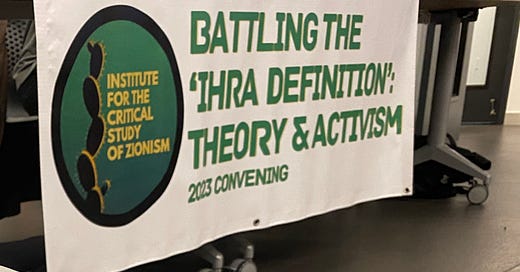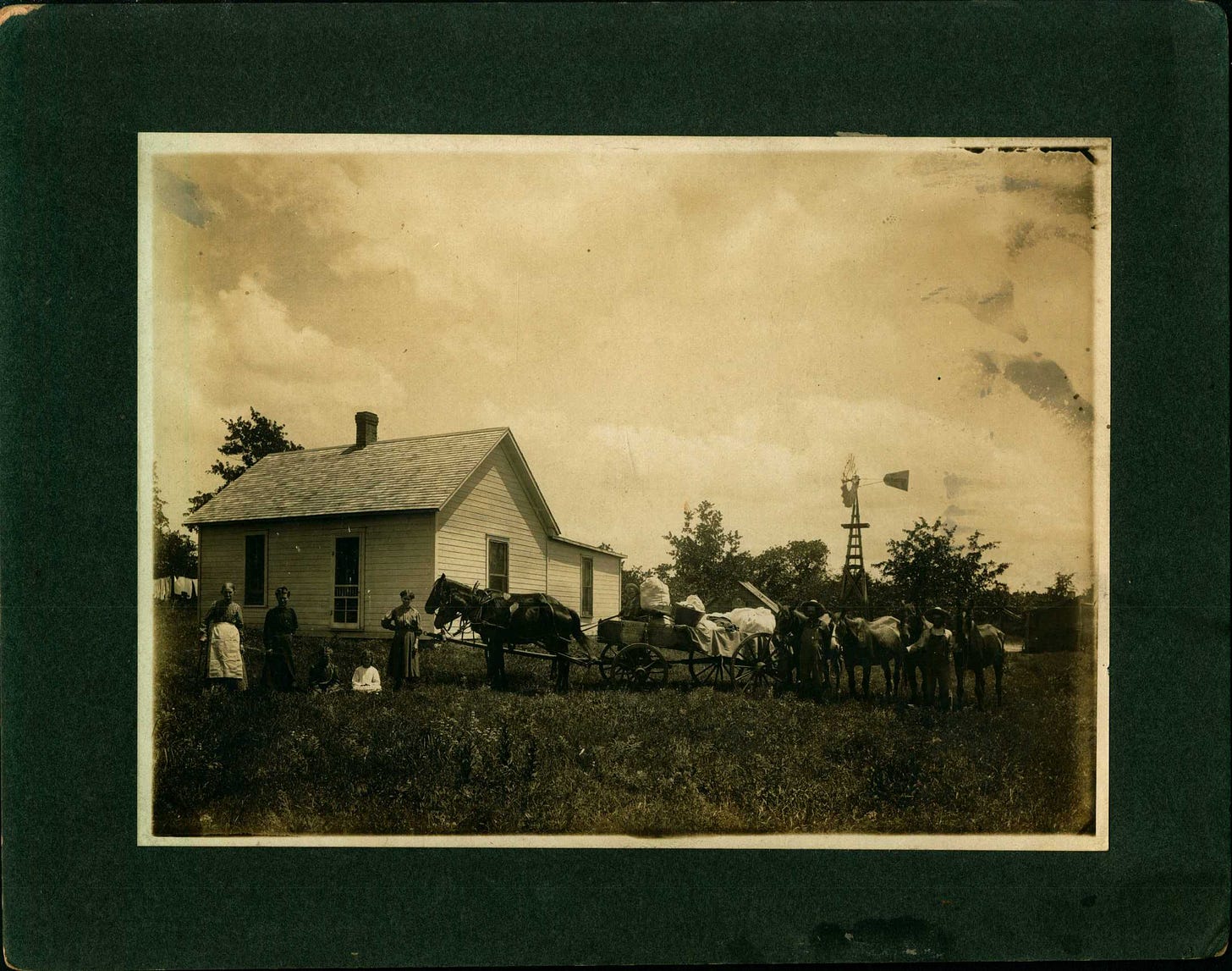I’ve not been writing as much here because I’ve been traveling: three academic conferences just in October, four if you count the one here in the city.
At a recent conference in Philadelphia, I sat in a circle of Internet researchers and listened to one scholar say something like, “I think we need to attend to the way whiteness shapes our work at every stage,” even though I’ve read her work for years and she’s never once addressed it. Later, over brunch with friends and safely out of earshot of that researcher I referred to her comment and said, “Welcome to the struggle, Becky.”
On Palestine, I’m the Becky who is late to the struggle, but I get it now.
After my last entry here, a reader contacted me to let me know that I was being antisemitic and was clearly “deficient” in my empathy for the Jewish people. It hurt me to read those words, but it also confused me. I didn’t understand how expressing solidarity with the Palestinian people could be construed as antisemitism but I have been on a learning and studying spree since October 7, and I’m no longer afraid of that charge. Yes, it’s terrible that there are Israeli hostages and deaths. It is also the case that the Israeli government has killed more than 8,000 Palestinians, including many children, in the span of 22 days, with a clearly stated goal of “eliminating” all of Gaza. This is genocidal language in the service of an ethno-nationalist agenda.
Since all this started, I have stopped listening to or reading mainstream news outlets and started paying attention to scholars who have worked on the issue of Palestine for decades, and to the voices of people on the ground in Gaza. It has profoundly changed my perspective on Israel, which I now see is an occupying force carrying out a settler colonialist agenda on the Palestinian people, with western powers cheering them on and funding them because they share the same goals, like the development of surveillance technology.
A crucial part of my education happened at the inaugural convening of the Institute for Critical Study of Zionism, organized by a founding collective of scholars and activists, and led by Dr. Emmaia Gelman. I said very little and just listened for a full day of presentations. The banner for the conference was billed as, “Challenging the IHRA Definition.” The IHRA is the International Holocaust Remembrance Alliance. This is the definition that equates ANY criticism of the state of Israel with antisemitism.
One scholar who drafted the definition has since backed away from it because it has been weaponized by the right-wing, but that hasn’t slowed the widespread adoption of the definition across the west, including at many colleges and universities. By equating any criticism of Israel with antisemitism, it shuts down any critique, debate or discussion, and this is a clear threat to academic freedom, one of the core values of higher education.
The IHRA definition also works as a subtle form of disinformation because it confuses people about what’s happening, and thus, works to intimidate people into not speaking up because they are so afraid of being labeled antisemitic. This was certainly true for me before all this. I hid out under the “it’s complicated” excuse. But, what I’ve come to realize is that it’s actually not that complicated. Once you understand what settler colonialism looks like, it’s easier to spot in other contexts.
The settlers in Israel benefited from a program much like the one that enabled my own family’s rush to “claim land” in Oklahoma from Native Americans, with the help of the U.S. government’s Homestead Act (1862). This law gave 160-acre plots to citizens “willing to farm” the land. The people who lived on that land, Indigenous tribal nations, were systematically removed to make way for white settlers, like my (paternal) great grandfather.
Just as I was always taught that the Native Americans were a footnote to the more important history of establishing America’s manifest destiny, I was also taught that the Palestinians were a footnote to the more important history of establishing a homeland for the Jewish people in Israel. In both cases, the stories are the relics of earlier propaganda campaigns. The defense from present-day settlers, is always the same, “I stole this, now it is mine and I will fight to the death to defend it,” and then invoke the Bible to try to sanctify the murdering and stealing.
Prior to World War II, Zionism, that is, the idea that the Jewish people should have a separate, sovereign nation as the only viable solution to antisemitism that they faced was not a popular idea. In fact, the early versions of Zionism were regarded as a fringe idea without much support across the world. After the war, as Abdul-Wahab Kayyali points out here, there were three factors related to imperialism that came together to give Zionism a boost: 1) the growth of European imperialism, which demanded raw materials and new markets for finished products, and viewed the region of the Middle East as a “gateway” to Africa and a “bridge” to Asia; 2) a failure of European liberalism to fully incorporate Jewish people into civic and economic life, thus setting up a kind of “apartness;” and, 3) the spread of aggressive and chauvinist nationalism in Europe that stressed racial qualities and the racial basis of the nation and the nation-state as well as racial superiority. It’s this last bit that is so crucial and that I didn’t understand until recently. Even the ways that Europeans tried to reckon with the Holocaust (and, the way Americans did not), relied on racist ideas about the nation-state.
For example, a question that I was taught to consider about the Holocaust: Was there something peculiar to the German national character that made them especially suited to carry out this atrocity? This kind of question has the ethnonationalism baked into it (and, this ethnonationalism is why the far right wants to do away with birthright citizenship here).
Following World War II, rather than posing post-War question, as say, W.E.B. Du Bois or Aimé Césaire might: How was the Holocaust an extension of colonial modernity?, Europeans decided to go with the ethnonationalism of seeing Jewish people as inherently, ontologically separate and thus, in need of their own ethnonationalist state. For Americans in the post-War boom, we preferred to cling to the lie of exceptionalism, that we are a “shining city on a hill,” a democratic example for all the rest of the world to follow, rather than examine the shadow side of the reality that our homegrown genocide of Native Americans and brutalization of African Americans in chattel slavery served as templates for Hitler’s final solution. There was no reckoning here, in the U.S., about the Jewish people, including children, that we turned away and sent back to certain death in the camps. Better to assuage that collective guilt with the settler colonialist project of Zionism than with any serious disruption in Western imperialism. What seems clear today is that establishing Israel was an extension of those imperialist aims, rather than an exception to them.
One of the keys for me in unlearning what I’ve been taught about Israel was seeing “The Blue Box,” a recent documentary by Michal Weits, the great-granddaughter of Yosef Weits, considered one of the founders of Israel’s forests. The film starts out with interviews of descendants of Yosef, all cousins, siblings, uncles, of the filmmaker. They chat happily about their ancestor as they discuss his work planting trees. Then, when the question of “the Transfer” (the euphemism for what Palestinians call the “Nakba,” or catastrophe) comes up, the relatives turn cold. Their expressions are confused at first, could she really be asking this, then they turn to stone. “I don’t want to be a part of this,” her father says to her near the end of the film, after suggesting that, had she been around in 1948 or 1949, she would have been standing proudly with her great-grandfather’s cause.
I recognized this immediately because it’s what I saw when I tried to talk to my father about his father, my grandfather, who had been in the Klan. An icy stare, conversation over. “I don’t want to be a part of this…” investigation into what our family has done in the service of settler colonialism. “I don’t want to be a part of this…” but we are part of it, even if we can’t bear the weight of these facts, it doesn’t change their heaviness or the force they continue to have in the present. I think it is so hard to face these facts because we are attached to an idealized view of ourselves and are attached to parts of our identities. The shadow side of this idealized vision of ourselves is the brutality required to be a settler.
Dr. Gabor Maté, Hungarian-Canadian physician, author, and Holocaust survivor, has talked about his transformation from Zionist to anti-Zionist Jew. As early as 2014, Maté mourned the “nightmare” that Israel has become in the occupation. In an interview earlier this month, he said this about the Israeli occupation of Palestine:
“I visited the Occupied Territories (West Bank) during the first intifada. I cried every day for two weeks at what I saw; the brutality of the occupation, the petty harassment, the murderousness of it, the cutting down of Palestinian olive groves, the denial of water rights, the humiliations…and this went on, and now it’s much worse than it was then.
“It’s the longest ethnic cleansing operation in the 20th and 21st century. I could land in Tel Aviv tomorrow and demand citizenship but my Palestinian friend in Vancouver, who was born in Jerusalem, can’t even visit!
“So then you have these miserable people packed into this, horrible…people call it an ‘outdoor prison’, which is what it is. You don’t have to support Hamas policies to stand up for Palestinian rights, that’s a complete falsity. You think the worse thing you can say about Hamas, multiply it by a thousand times, and it still will not meet the Israeli repression and killing and dispossession of Palestinians.
In many ways, the violence that’s happening now is because Israel is a failed settler colonial project because the Palestinian people still exist despite a seven-decades-long attempt at annihilating them. I think future historians will look back on the events of October, 2023 as a turning point when people around the world began to see the project of settler colonialism for what it is, and began to demand liberation for the Palestinian people. That’s what’s given me hope in the last few weeks is seeing all the demonstrations around the world of people standing in solidarity with Palestinians.






So, welcome to the struggle, Becky. It doesn’t matter that I’m late, or you’re late. One of the most profound things I’ve learned in recent weeks was from one of the speakers at the ICSZ conference, who said (paraphrasing):
“Our feelings about all this, whether criticizing Israel is antisemitism or not, it’s all a distraction. Just as Toni Morrison said about racism, the very real point of it is to distract us. Talking about the IHRA definition of antisemitism is a distraction from the very real struggle of the Palestinian people to survive this occupation.”
What matters is that we can join in solidarity with everyone, around the world, coming together, marching to say: “Never again for anyone.”





